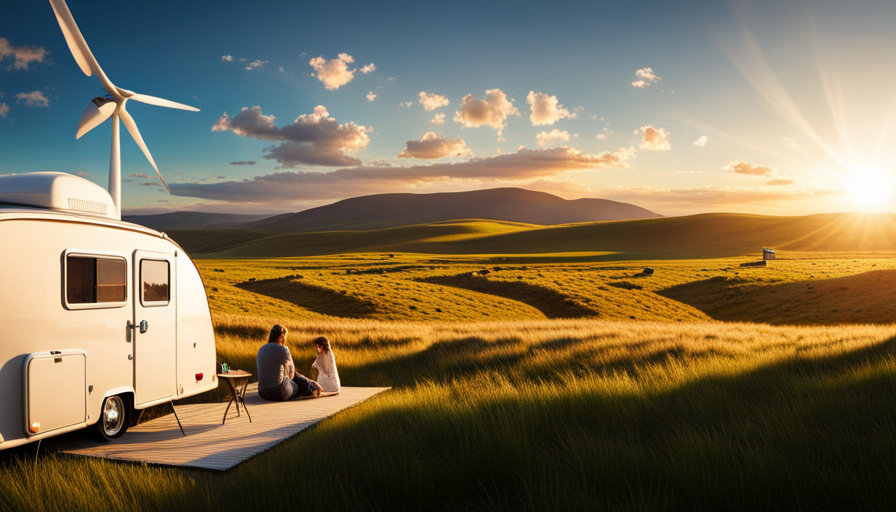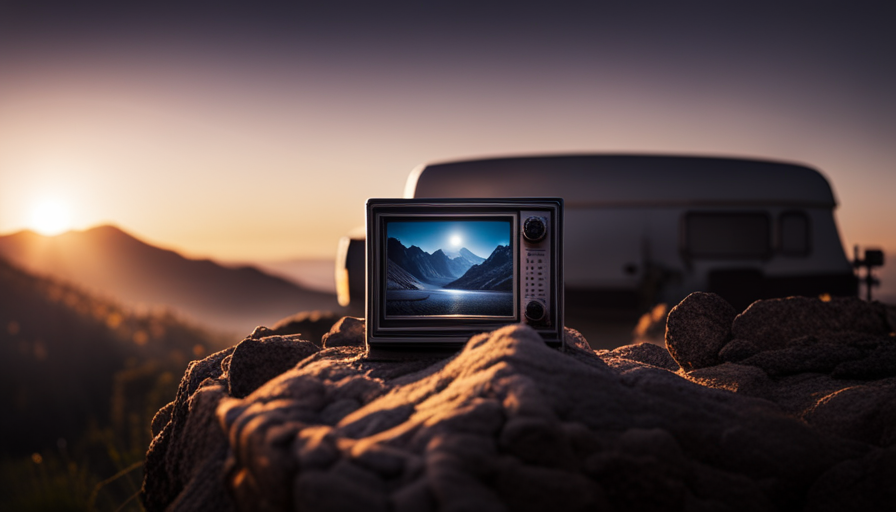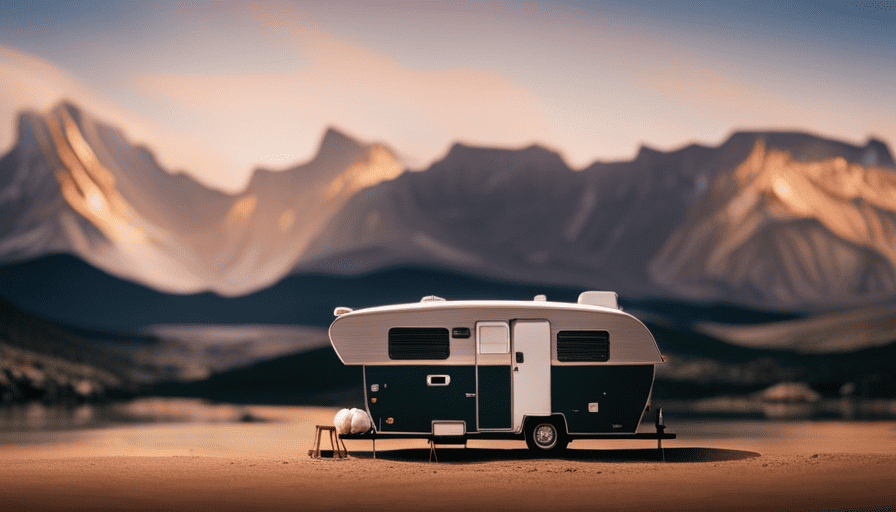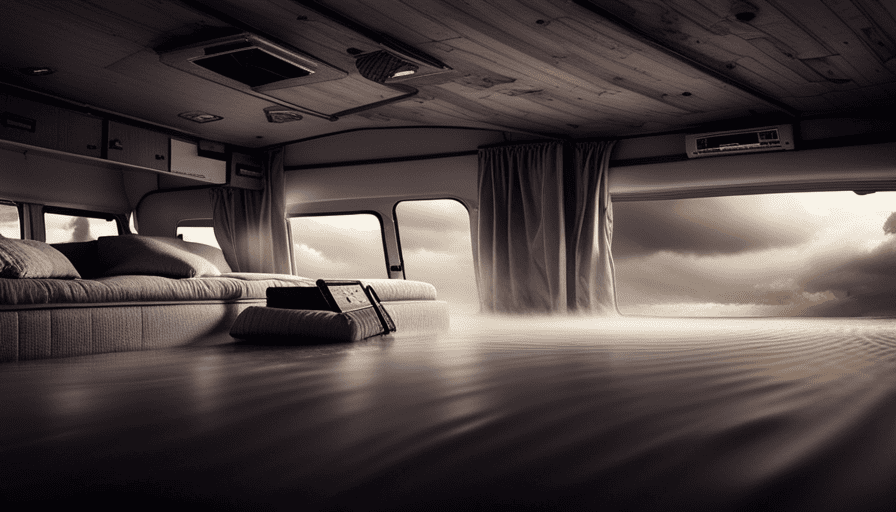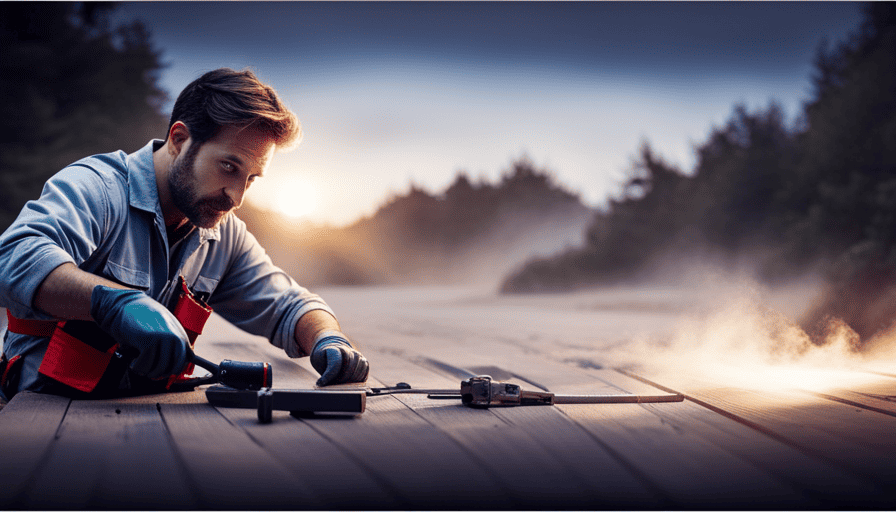As the sun sets and the warm glow envelops the rugged terrain, I am amazed by the beauty that envelops me. Tucked away in the wilderness, my camper serves as a refuge, a safe place where I can escape from the busyness of everyday life. To fully embrace this off-grid existence, I must guarantee that my camper has the necessary power to support me.
In this article, I will guide you through the process of powering your camper off-grid. With a technical and analytical approach, we will explore how to assess your power needs, choose the right solar panels, determine battery capacity, install an inverter, and even consider a portable generator.
We will delve into the importance of LED lighting, monitoring energy usage, and practicing responsible waste management. By following these data-driven steps, you too can enjoy the freedom of off-grid camping, where the only limit is the horizon.
Key Takeaways
- Assess power needs and calculate power requirements for off-grid camper
- Use solar power as recommended source of energy
- Determine battery capacity for storing solar power
- Consider portable generators as additional power source for off-grid camping trips
Assess Your Power Needs
Now that you’ve made the exciting decision to live off-grid in your camper, it’s time to assess your power needs and determine how to keep all your essential devices running smoothly.
When it comes to powering your camper off-grid, solar power is an excellent option. It’s environmentally friendly and provides a reliable source of energy.
To begin, you need to understand your energy consumption. Take note of all the devices you plan to use in your camper, including lights, appliances, and electronics. Calculate their power requirements and estimate the number of hours you’ll use them each day. This will give you an idea of your daily energy consumption.
From there, you can determine the size and number of solar panels you need to meet your power needs. It’s crucial to choose the right solar panels that can generate enough energy to power your devices. Consider the wattage and efficiency of the panels to ensure they can provide sufficient power.
By accurately assessing your power needs and choosing the right solar panels, you can successfully power your camper off-grid.
Choose the Right Solar Panels
To ensure an independent and sustainable energy source for your mobile home, you’ll want to select the ideal solar panels that perfectly suit your needs. When choosing solar panels for off-grid camper power, there are two key factors to consider: solar panel efficiency and solar panel installation.
Solar panel efficiency refers to how well the panel converts sunlight into usable electricity. Higher efficiency panels produce more power with the same amount of sunlight, which is crucial when space is limited on a camper. Look for panels with a high efficiency rating, typically around 20% or higher, to maximize the energy output.
Next, consider the ease of solar panel installation. Camper roofs are often small and may have limited space for mounting solar panels. Flexible panels can be a great option for curved or irregular surfaces, while rigid panels are more suitable for flat areas. Additionally, lightweight panels are preferable to minimize the impact on your camper’s weight.
By carefully considering both solar panel efficiency and installation requirements, you can select the perfect panels for your off-grid camper. Once you have determined the battery capacity needed, you’ll be one step closer to achieving a self-sufficient power system for your mobile home.
Determine the Battery Capacity
Selecting the perfect battery capacity will ensure you have enough energy to power your mobile home and enjoy a worry-free off-grid experience. When determining the battery capacity for your camper, it’s important to consider factors such as power consumption, battery maintenance, and battery charging.
To determine the right battery capacity, you need to calculate your power requirements. Start by making a list of all the appliances and devices you plan to run in your camper, along with their power ratings in watts. Multiply each device’s power rating by the number of hours you plan to use it per day, and sum up the total watt-hours. This will give you an estimate of your daily energy consumption.
Once you have your daily energy consumption, you can choose a battery capacity that can meet your needs. A common way to measure battery capacity is in ampere-hours (Ah). Divide your total daily energy consumption in watt-hours by the nominal voltage of your system to get the required battery capacity in ampere-hours.
Incorporating a 3×3 table can provide a clear visualization of the calculations:
| Appliance | Power Rating (W) | Daily Usage (hours) | Energy Consumption (Wh) |
|---|---|---|---|
| Fridge | 100 | 24 | 2400 |
| Lights | 20 | 4 | 80 |
| Water Pump | 50 | 1 | 50 |
| Total | 2530 |
Once you have determined the required battery capacity, you can move on to installing an inverter to convert the DC power from the batteries into AC power for your camper.
Transitioning to the next section, installing an inverter will allow you to utilize the energy stored in your batteries and power your camper’s appliances and devices with ease.
Install an Inverter
Once you’ve determined the right battery capacity for your mobile home, it’s time to add convenience and versatility by installing an inverter.
An inverter is an essential component that converts the DC power stored in your batteries into AC power, allowing you to effortlessly harness the stored energy and utilize a wide range of appliances and devices.
To begin the inverter installation process, you’ll need to gather the necessary tools and materials. These typically include an inverter, appropriate cables, and a fuse or circuit breaker. It’s important to choose an inverter that matches your power requirements and is compatible with your battery system.
Next, you’ll need to locate a suitable location to mount the inverter. This should be a well-ventilated area with easy access for maintenance. Once you’ve found the ideal spot, securely mount the inverter using the provided brackets or screws.
After mounting the inverter, you can connect it to your battery system. Follow the manufacturer’s instructions carefully, ensuring proper polarity and secure connections. Once everything is connected, you can switch on the inverter and test its functionality.
With the inverter installed, you now have a reliable power supply that can handle a variety of appliances and devices. However, it’s important to consider a portable generator as an additional power source for situations where your battery capacity might not be sufficient or when you need backup power.
Consider a Portable Generator
Consider adding a portable generator to your setup, like having an emergency flashlight in your car for unexpected dark nights on a deserted road.
When it comes to off-grid camping, having a reliable source of power is crucial. Portable generators offer a convenient solution to meet your energy needs while on the road. There are various portable generator options available, ranging from small, lightweight models to larger, more powerful ones. Consider factors such as wattage, fuel type, noise level, and runtime when selecting the right generator for your camper.
To ensure optimal performance and longevity of your portable generator, regular maintenance is essential. This includes checking the oil levels, air filters, and spark plugs, as well as cleaning the generator and its components. It’s also important to follow the manufacturer’s guidelines for fuel usage and storage. Proper maintenance will not only extend the lifespan of your generator but also ensure that it operates efficiently and reliably during your off-grid adventures.
Now that you’ve considered a portable generator for your camper, let’s explore how to optimize energy efficiency and make the most out of your off-grid power system.
Optimize Energy Efficiency
To get the most out of your energy system, you’ll want to maximize efficiency and make every watt count. Energy conservation is key when powering a camper off-grid. Here are three ways to optimize energy efficiency and ensure you have enough power for your needs:
-
Invest in Energy-Efficient Appliances: Look for appliances specifically designed for off-grid use that are energy-efficient. These appliances are designed to consume less power while still providing the necessary functionality. For example, there are refrigerators with improved insulation and low-power consumption, as well as efficient cooking appliances that use less energy.
-
Utilize Renewable Resources: Take advantage of renewable resources such as solar power. Installing solar panels on your camper’s roof can generate clean and sustainable energy to power your appliances and devices. Additionally, consider using wind turbines or hydroelectric power if they’re available in your camping location.
-
Monitor and Manage Power Usage: Install an energy monitoring system to keep track of your power consumption. This will help you identify areas where you can reduce energy usage and make adjustments accordingly. Use power-saving settings on your devices and unplug any unnecessary electronics.
By implementing these energy conservation strategies and utilizing renewable resources, you can optimize your energy efficiency and reduce your reliance on traditional power sources. This will not only save you money but also contribute to a more sustainable camping experience.
Transitioning into the next section, let’s explore the benefits of using LED lighting.
Use LED Lighting
To optimize energy efficiency in a camper, I previously discussed various strategies, such as insulating the camper and using energy-efficient appliances. Now, let’s delve into another effective method: using LED lighting.
LED lighting offers several benefits that make it an ideal choice for off-grid campers. First and foremost, LEDs are incredibly energy-efficient, consuming significantly less power compared to traditional incandescent bulbs. This efficiency translates into longer battery life, allowing you to extend your off-grid adventures without worrying about running out of power.
Moreover, LED lights produce minimal heat, reducing the risk of fire hazards in the confined space of a camper. They are also durable and shock-resistant, making them suitable for the bumps and vibrations experienced on the road. Additionally, LED lights come in a variety of colors and styles, allowing you to create a personalized and inviting atmosphere inside your camper.
When it comes to LED lighting installation, it’s essential to choose fixtures specifically designed for 12-volt DC power systems commonly found in campers. These fixtures are easy to install and ensure compatibility with your camper’s electrical system.
By incorporating LED lighting into your camper, you can significantly reduce your energy consumption while enjoying the benefits of efficient and long-lasting illumination. In the next section, we will explore how to monitor your energy usage and ensure you stay within your power limits.
Monitor Your Energy Usage
Keeping an eye on your energy usage is crucial to ensure you don’t surpass your energy limits and can continue enjoying your off-grid adventures worry-free. Tracking consumption and managing resources efficiently are key to maintaining a sustainable power supply for your camper. Here are five important steps to help you monitor your energy usage effectively:
-
Install a smart energy monitor: This device provides real-time data on your power consumption, allowing you to identify energy-hungry appliances and adjust your usage accordingly.
-
Use a power meter: By using a power meter, you can track the electricity usage of individual appliances, helping you make informed decisions about which ones to prioritize or replace with more energy-efficient options.
-
Keep a log: Maintaining a log of your energy usage will enable you to identify consumption patterns and make adjustments to optimize your power management strategies.
-
Set energy usage goals: By setting specific energy usage goals, you can challenge yourself to reduce consumption and find innovative ways to conserve energy.
-
Implement automation: Utilize smart home technology to automate energy usage, such as using timers or motion sensors to control lighting and appliances.
By actively monitoring and managing your energy consumption, you can maximize the efficiency of your off-grid power system and prolong your camping adventures. Transitioning into the next section, it’s equally important to practice responsible waste management to ensure a sustainable and eco-friendly camping experience.
Practice Responsible Waste Management
Implementing responsible waste management practices is essential to preserving the beauty of our natural surroundings and ensuring a sustainable and eco-friendly camping experience. When camping off-grid, it’s crucial to prioritize responsible waste disposal methods that minimize our impact on the environment.
One of the first steps is to reduce waste generation by opting for reusable items, such as water bottles, utensils, and food containers. This not only minimizes the amount of waste produced but also helps conserve resources.
Additionally, it’s important to properly dispose of any waste generated during the camping trip. This includes separating recyclables from non-recyclables and ensuring that all waste is disposed of in designated bins or facilities. By following these practices, we can contribute to a cleaner and healthier environment.
Transitioning into the subsequent section about enjoying the freedom of off-grid camping, it’s important to note that responsible waste management not only benefits the environment but also allows us to fully appreciate and enjoy the freedom of off-grid camping without the guilt or negative impact on the natural surroundings.
Enjoy the Freedom of Off-Grid Camping
Indulge in the liberating experience of camping without any boundaries, where nature becomes your playground and the world is your oyster. When it comes to off-grid camping, one of the key aspects to consider is how to power your camper. But once you’ve mastered this, you can truly enjoy the freedom of off-grid camping.
Off-grid cooking is a crucial part of the off-grid camping experience. To cook your meals without relying on traditional electricity sources, you can opt for portable stoves or grills that run on propane or butane. These fuel sources are readily available and can provide a reliable and efficient cooking solution.
Another important consideration is your off-grid water supply. While camping, you can collect rainwater using a rainwater harvesting system. This can be done by setting up a rain barrel or a collection system that captures rainwater from your camper’s roof. Additionally, you can also bring along water filters or purification tablets to ensure that the water you collect is safe for drinking and cooking.
By incorporating off-grid cooking methods and ensuring a sustainable water supply, you can fully enjoy the freedom of off-grid camping. So go ahead, explore the great outdoors, and embrace the simplicity and self-sufficiency that off-grid camping offers.
Frequently Asked Questions
Are there any alternatives to using solar panels for powering a camper off-grid?
When it comes to powering a camper off-grid, there are alternatives to using solar panels. Wind turbines and generator options can provide additional power sources.
Wind turbines harness the energy of the wind to generate electricity, making them a viable option in areas with consistent wind patterns.
Generator options, such as gasoline or propane-powered generators, can also be used to supply power to the camper. These alternatives offer flexibility and reliability in off-grid power solutions.
How long does it typically take to install an inverter in a camper?
Installing an inverter in a camper can vary in time depending on several factors. Factors such as the complexity of the electrical system, the specific model of the inverter, and the experience of the installer can all affect installation time. On average, however, an inverter installation can typically be completed within a few hours to a full day.
It’s important to consult with a professional to ensure a proper and efficient installation.
What are the best practices for optimizing energy efficiency in a camper?
To optimize energy efficiency in a camper, it’s crucial to focus on using energy-saving appliances and implementing effective insulation techniques. Energy-saving appliances, such as LED lights and low-power consumption refrigerators, can significantly reduce energy consumption.
Additionally, improving insulation in the camper’s walls, windows, and doors can minimize heat loss or gain, reducing the need for excessive heating or cooling. These strategies can maximize energy efficiency, ensuring a sustainable and comfortable off-grid camper experience.
How can I monitor my energy usage while camping off-grid?
When camping off-grid, it’s essential to monitor energy usage to ensure I don’t drain my battery unexpectedly. Energy monitoring allows me to keep track of how much power I’m consuming and make adjustments accordingly. By knowing my battery capacity and monitoring my energy usage, I can optimize my power usage and avoid running out of juice in the middle of nowhere.
It’s like having a fuel gauge for my camper’s electrical system.
What are some important tips for practicing responsible waste management while camping off-grid?
Practicing responsible waste management while camping off-grid is crucial. One effective solution is using composting toilets, which break down waste into compost instead of relying on water and sewage systems. These toilets are environmentally friendly and require minimal maintenance.
Additionally, separating waste into designated bins for recycling, composting, and general waste is essential. By implementing these strategies, campers can minimize their environmental impact and promote sustainable camping practices.
Can I Use the Same Methods to Power a Camper at Home as I Would Off-Grid?
Can I use the same methods for powering a camper at home as I would off-grid? While some methods may overlap, it’s important to consider the differences. Off-grid systems often rely on solar panels, batteries, and generators, whereas powering a camper at home might require connecting to the electrical grid or utilizing a dedicated outlet. Consulting a professional can ensure you choose the right method for your specific needs.
Conclusion
As the sun sets on our off-grid camping adventure, I can’t help but be amazed by the power of self-sufficiency. Just like the solar panels that harness the sun’s energy, we too can tap into our own inner strength to overcome any obstacle.
With careful planning and the right equipment, we’ve unlocked a world of freedom and possibility. So let’s embrace the symbolism of our off-grid journey, where every watt of power represents our determination and resilience.

